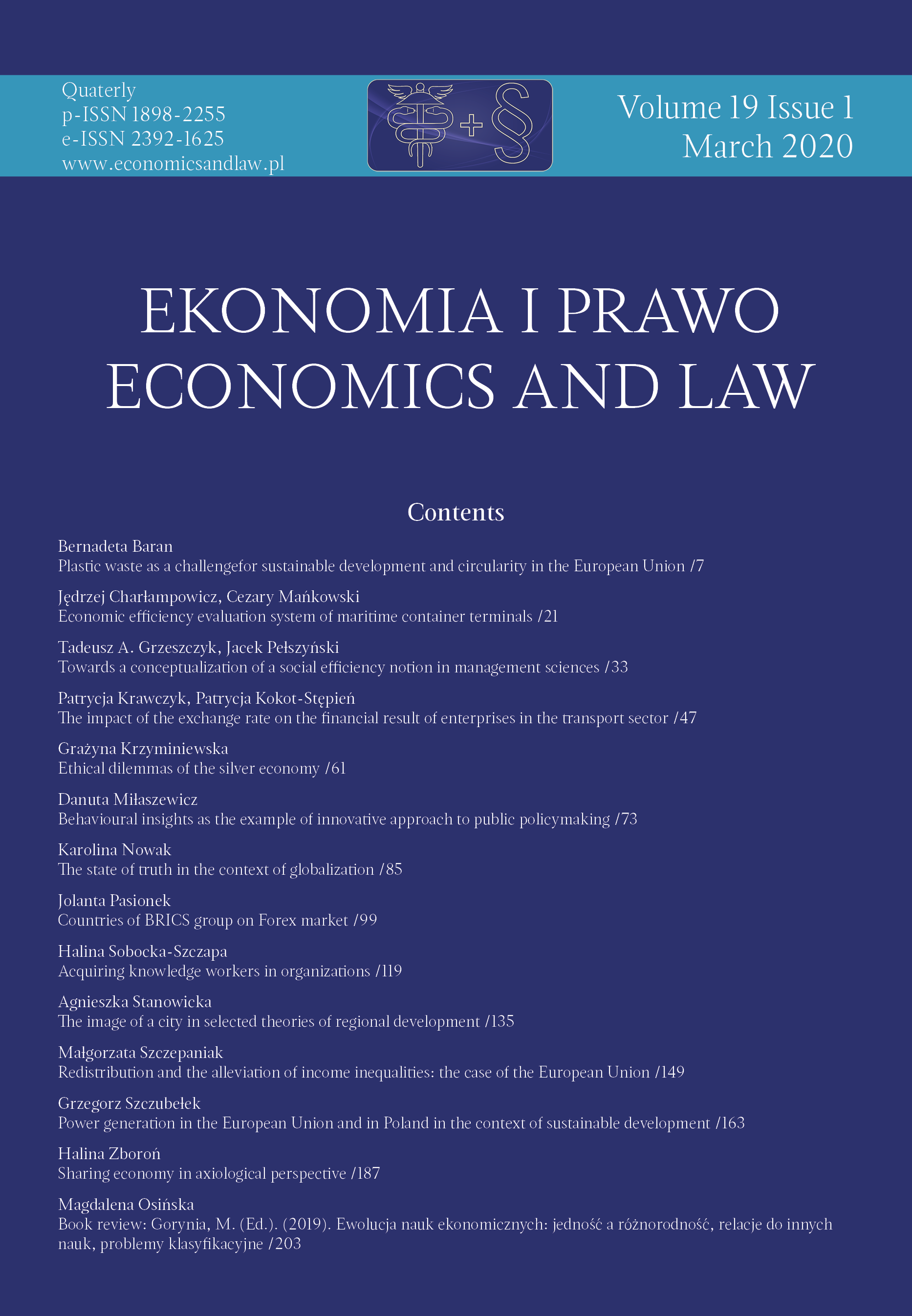The state of truth in the context of globalization
DOI:
https://doi.org/10.12775/EiP.2020.007Keywords
values, truth, globalization, access economy, cultureAbstract
Motivation: This article addresses the issue of the functioning of modern societies in the context of worldview transformations related to globalization processes. Whether today’s globalization processes — the dissemination of specific models, designs, systems, tools and narrations in socio-cultural-economic-political dimensions — have significantly redefined the notion of truth and strengthened (or perhaps weakened) its validity (phenomenon)? The main motivation to undertake this research was the desire to show the role and the strengthening of value (truth) in social practice, in particular in relation to scientific and economic practice.
Aim: The purpose of the article is to answer the question how globalization (in the socio-economic-cultural aspect) affects new ways of redefining the truth, treated as the axiological basis of scientific practice. The economic aspect has been taken into account in particular in the context of the establishment of a new (technological) approach to truth based on globalization processes taking place within the framework of network economics and on-demand economy. The literature review reconstructs two historically significant ways of redefining truth as the base value for scientific practice (autotelic and socio-useful) in order to show the breadth of socio-economic changes associated with the new definition of truth (as a technological value). The article is theoretical, based on philosophical considerations, recognized in a cultural perspective; the humanistic interpretation was applied.
Results: The result of the research is to show: 1. the continuity of the process of redefining the truth, 2. the need to take into account the axiological context in relation to new types of economic practice.
References
Andreas, H., & Schiemer, G. (2016). A choice-semantical approach to theoretical truth. Studies in History and Philosophy of Science: Part A, 58. doi:10.1016/j.shpsa.2016.02.001.
Bauman, Z. (2010). Żyjąc w czasie pożyczonym: rozmowy z Citlali Rovirosa-Madrazo. Warszawa: Wydawnictwo Literackie.
Diaconu, M. (2014). Truth and knowledge in postmodernism. Procedia: Social and Behavioral Sciences, 137. doi:10.1016/j.sbspro.2014.05.270.
Giddens, A. (2006). Miłość, seks i inne uzależnienia. In P. Sztompka, & M. Kucia (Eds.), Socjologia: lektury. Kraków: Znak.
Habermas, J. (2002). Teoria działania komunikacyjnego. Volume 2. Warszawa: PWN.
Inglehart, R. (2006). Pojawienie się wartości postmaterialistycznych. In P. Sztompka, & M. Kucia (Eds.), Socjologia: lektury. Kraków: Znak.
James, W. (1983). What pragmatism means? In S.E. Stumpf (Ed.), Philosophy: history and problems. New York: McGraw-Hill.
James, W. (2001). Pragmatism’s conception of truth. In M.P. Lynch (Ed.), The nature of truth: classic and contemporary perspectives. Cambridge: Mass MIT Press. doi:10.7551/mitpress/4884.003.0018.
Kmita, J. (1973). Wykłady z logiki i metodologii nauk: dla studentów wydziałów humanistycznych. Warszawa: PWN.
Kmita, J. (1995). Jak słowa łączą się ze światem: studium krytyczne neopragmatyzmu. Poznań: UAM.
Kmita, J., & Banaszak, G. (1991). Społeczno-regulacyjna koncepcja kultury. Warszawa: Instytut Kultury.
Kołakowski, L. (2009). Kultura i fetysze. Warszawa: PWN.
Kotowa, B. (2001). Efektywność wiedzy a jej uprawomocnienie. In A. Motycka (Ed.), Wiedza a wartości. Warszawa: PAN.
Kuhn, T.S. (2009). Struktura rewolucji naukowych. Warszawa: Aletheia.
Laketa, S. (2019). ‘Even if it didn’t happen, it’s true’: the fantasy of geopolitics in the ‘post-truth’ era. Emotion, Space and Society, 31. doi:10.1016/j.emospa.2018.01.002.
Łagosz, M. (2014). Innowacja: nowa królowa Polski. Gazeta Wyborcza, 25–26.01.2014.
Maddy, P. (2007). Second philosophy: a naturalistic method. Oxford: Oxford University Press. doi:10.1093/acprof:oso/9780199273669.001.0001.
Picciotto, R. (2019). Is evaluation obsolete in a post-truth world? Evaluation and Program Planning, 73. doi:10.1016/j.evalprogplan.2018.12.006.
Robbins, R.H. (2008). Globalne problemy a kultura kapitalizmu. Poznań: Pro Publico.
Robertson, R. (1992). Globalization: social theory and global culture. London: Sage. doi:10.4135/9781446280447.
Rorty, R. (1999). Obiektywność, relatywizm i prawda: pisma filozoficzne. Volume 1. Warszawa: Aletheia.
Sztompka, P. (2012). Socjologia: analiza społeczeństwa. Kraków: Znak.
Śliwiński, A. (2015). Ekonomia sieci: jak globalne sieci opętały świat? Warszawa: Iota Unum.
Tarski, A. (1995). Pisma logiczno-filozoficzne. Volume 1: prawda. Warszawa: PWN.
Tuchańska, B. (2012). Dlaczego prawda?: prawda jako wartość w sztuce, nauce i codzienności. Warszawa: Poltext.
Winfield, R.D. (2001). Autonomy and normativity: investigations of truth, right and beauty. Aldershot: Ashgate. doi:10.4324/9781315201627.
Woleński, J. (2007). Epistemologia: poznanie, prawda, wiedza, realizm. Warszawa: PWN.
Downloads
Published
How to Cite
Issue
Section
Stats
Number of views and downloads: 537
Number of citations: 0
